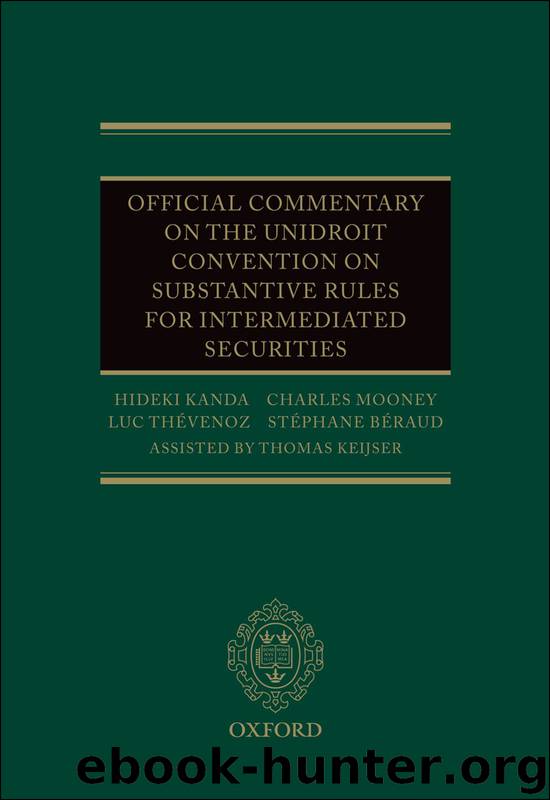Official Commentary by Hideki Kanda

Author:Hideki Kanda
Language: eng
Format: epub
Tags: Unidroit Convention on Substantive Rules for Intermediated Securities
Publisher: Oxford University Press
Published: 2012-10-23T04:00:00+00:00
2. Paragraph 2: Exceptions
23-16
Paragraph 1 of Article 23 is subject to paragraph 2. This second paragraph contains a list of exceptions to the general rule, i.e., situations where the intermediary may be bound or entitled to follow the instructions given by a person other than the account holder. With regard to these exceptions, even though the list is exhaustive, they are intended to be fairly wide-ranging and in certain cases apply cumulatively.
23-17
Article 23(2) contains five categories. The first two exceptions are based on the consent of the account holder (sub-paragraphs 2(a) and (b)), the third on the intervention of a public authority (sub-paragraph 2(c)), the fourth on the operation of the non-Convention law (sub-paragraph 2(d)), and the fifth on the need to respect the particularities of SSSs (sub-paragraph 2(e)).
23-18
Sub-paragraph 2(a) is based on the consent of the account holder and foresees the case where the intermediary and the account holder have agreed that a third party is allowed to give instructions to the intermediary.
EXAMPLE 23-4: P-1 has an investment adviser, P-2, who provides P-1 with financial advice but who does not have the legal capacity to act as an intermediary. A securities account is, accordingly, opened in the name of P-1 with IM. However, under an agreement between P-1 and IM, P-2 is authorised to give instructions to IM directly with regard to the securities credited to P-1’s securities account. In this case, IM is bound to follow the instructions of P-2 even though P-2 is not the account holder.
23-19
Article 23(2)(a) is an open rule with regard to the way the parties may agree on this issue and it expressly clarifies that the agreement to follow the instructions of a third party can derive from the provisions of (a) the account agreement, (b) any other agreement between the intermediary and the account holder or (c) any other agreement entered into by the intermediary with the consent of the account holder. In each case, the corresponding provisions must be examined to see if and under what conditions the intermediary is allowed, and obliged, to depart from the general rule stated in Article 23(1).
23-20
The second category, Article 23(2)(b), is also based on the consent of the account holder and applies in the case where the account holder has granted an interest effective under Article 12. Normally, the granting of an interest in favour of any person (including the intermediary) in accordance with Article 12 implies: (a) a limit to the rights of the account holder (i.e., the capacity of the account holder to give instructions to the intermediary is restricted) and/or (b) the concession of rights to the beneficiary of that interest to give certain instructions to the intermediary. In the latter case, the general rule laid down by Article 23(1) is subject to the rights of the beneficiary of the interest.
EXAMPLE 23-5: AH grants a security interest to CT under a “positive” control agreement. See Article 1(k)(ii). In this case, the intermediary is obliged to comply with the instructions given by CT under the conditions in the agreement without any further consent of AH.
Download
This site does not store any files on its server. We only index and link to content provided by other sites. Please contact the content providers to delete copyright contents if any and email us, we'll remove relevant links or contents immediately.
The Thirst by Nesbo Jo(5792)
Permanent Record by Edward Snowden(5007)
The Myth of the Strong Leader by Archie Brown(4795)
Spare by Prince Harry The Duke of Sussex(4219)
A Higher Loyalty: Truth, Lies, and Leadership by James Comey(4038)
Secrecy World by Jake Bernstein(3788)
Adulting by Kelly Williams Brown(3680)
The Borden Murders by Sarah Miller(3593)
Fear by Bob Woodward(3263)
Killers of the Flower Moon by David Grann(3257)
The Last Girl by Nadia Murad(3061)
The Secret Barrister by The Secret Barrister(3013)
Future Crimes by Marc Goodman(3007)
American Kingpin by Nick Bilton(2983)
Liar's Poker by Michael Lewis(2819)
The House on Mango Street by Sandra Cisneros(2781)
Graduate Admissions Essays, Fourth Edition: Write Your Way into the Graduate School of Your Choice (Graduate Admissions Essays: Write Your Way Into the) by Asher Donald(2478)
Delicious Torment by Linsey Lanier(2449)
Camino Island by John Grisham(2391)
